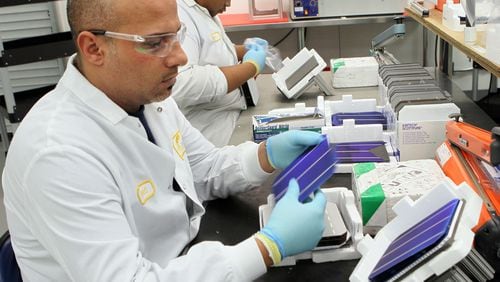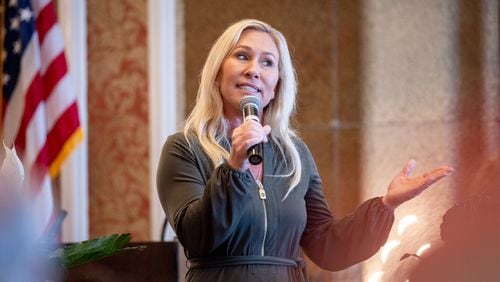Suniva Inc., a Norcross-based solar panel maker that received millions in federal, state and Gwinnett County incentives, has filed bankruptcy after falling victim to plunging prices for solar power cells.
Bankruptcy documents indicate the company has fired 230 workers in the past three weeks, and that its Georgia factory is being mothballed indefinitely by its 35 workers that remain on the job.
Meanwhile, the company indicated it may seek help from the government in fighting what it alleges is illegal dumping of cheap solar panels in the U.S. by Chinese manufacturers.
The bankruptcy by Suniva, one of the nation’s largest solar cell makers, comes only weeks after the company laid off most of its workers at its Gwinnett County headquarters and manufacturing plant.
Amid rumors that its suppliers weren’t being paid, Suniva also shut down another factory in Michigan last month.
It’s a sharp reversal for Georgia’s largest solar manufacturer and a blow to the state’s efforts to jump-start the high-tech industry here.
Nick Masino, a senior vice president with Partnership Gwinnett and the Gwinnett Chamber of Commerce, said the chamber would back Suniva’s efforts to seek trade assistance from Washington, D.C., and help its former workers to get new jobs.
“Our goal is to (help) Suniva in getting any federal assistance that they need to deal with the anti-dumping issue,” said Masino.
Suniva had been growing rapidly since its 2007 founding at Georgia Tech — much of it with the help of millions in tax credits for new jobs, grants and property tax abatements.
By late last year, Suniva had invested about $60 million toward a $100 million expansion to triple its production and add 500 jobs. It had 380 employees at the time, including 240 in Georgia.
An AJC analysis following the 2015 project announcement found the company could stand to receive up to $11 million in state incentives - largely from tax credits embedded in state law if it lived up to the promise of 500 new jobs.
At the time Gwinnett had provided at least $2.4 million in tax incentives to the company.
According to media reports in Michigan, Suniva also received $8.8 million in federal grants from 2010 to 2016, and millions more in incentives from the state government and communities in Michigan.
But a few months after showing off its expanded production line, Suniva disclosed a “temporary” shutdown of the Norcross plant. Bankruptcy documents indicate it is being mothballed indefinitely.
In a court filing, Suniva said it cut its remaining employees from 60 last week to a staff of 35 administrative and maintenance workers “critical to the preservation of value” of the firm’s assets.
The company also said staff were removing hazardous chemicals and other materials from the plant’s equipment that are used to manufacture solar panels.
“Currently, trained employees are working on removing these chemicals from the facility and purging them from the equipment and process plumbing systems,” the company said in a court filing.
Meanwhile, the company is considering filing a complaint with the U.S. International Trade Commission protesting Chinese subsidies for solar panel makers and moves by those companies to circumvent U.S. tariffs by shifting production to factories in other countries.
“These tariffs have not been effective in preventing dumping of Chinese solar products into the United States,” said David M. Baker, hired last week at Suniva’s chief restructuring officer, in a court filing.
A successful petition to the International Trade Commission “is integral to the successful reorganization” of Suniva, he said.
Since the end of 2014, he said, Suniva has lost $56.3 million, including almost $5.7 million in the first two months of this year.
As Suniva’s debt problems mounted, it shut down operations at the end of March and laid off 191 of its 265 employees, Baker said.
U.S solar manufacturers have stumbled over the past year from a combination of blows.
Chinese manufacturers have vastly expanded solar panel production, driving down solar cell prices. The resulting decline in solar panel prices has benefited customers, powering dramatic growth in solar energy installations by homeowners, utilities and other businesses across the nation, including in Georgia.
But low prices hurt solar manufacturers such as Suniva, and demand for solar panels has slowed recently both overseas and in the U.S.
Trump’s election raised questions about whether a key tax incentive for investments in solar power installations will be scrapped. The president has called investments in renewable energy like wind and solar power “a big mistake.”






